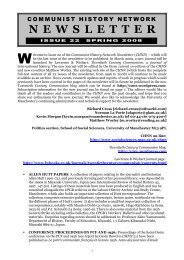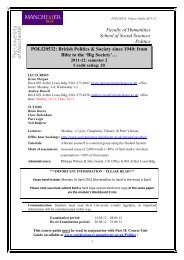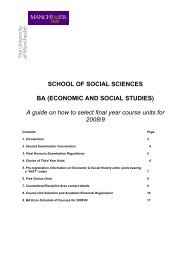second year course outlines 2012-2013 - School of Social Sciences ...
second year course outlines 2012-2013 - School of Social Sciences ...
second year course outlines 2012-2013 - School of Social Sciences ...
You also want an ePaper? Increase the reach of your titles
YUMPU automatically turns print PDFs into web optimized ePapers that Google loves.
Communication:<br />
Students must read their University e-mails regularly, as<br />
important information will be communicated in this way.<br />
Examination period: Monday 13 th May <strong>2013</strong> – Friday 7 th June <strong>2013</strong><br />
Re-sit Examination period: Monday 19 th August <strong>2013</strong> – Friday 31 st August <strong>2013</strong><br />
Please read this <strong>course</strong> outline through very carefully as it provides essential information<br />
needed by all students attending this <strong>course</strong><br />
This <strong>course</strong> guide should be read in conjunction with the Philosophy Study Guide.<br />
Copies may be obtained from the Undergraduate Office, G.001 Arthur Lewis Building or from<br />
the SoSS intranet at: http://www.socialsciences.manchester.ac.uk/intranet/ug/handbooks/<br />
2. ABOUT THE COURSE<br />
Summary<br />
This <strong>course</strong> introduces several major controversies in the philosophy <strong>of</strong> science and uses<br />
them to investigate the nature <strong>of</strong> science, its methods, and its accomplishments. We discuss<br />
the following:<br />
What is science? How do scientific theories differ from other kinds <strong>of</strong> theory, for example<br />
religious or philosophical theories?<br />
The problem <strong>of</strong> induction: why believe that any pattern <strong>of</strong> events which has been observed<br />
will occur again? Can the past behaviour <strong>of</strong> things give reason to predict how they will<br />
behave? Are such predictions unjustified and irrational?<br />
The nature <strong>of</strong> confirmation: what counts as evidence for a theory? Is any true<br />
consequence <strong>of</strong> a theory evidence for it?<br />
Falsificationism: instead <strong>of</strong> taking observations to confirm theories, should we take<br />
observations only to refute theories? This is Popper's methodology <strong>of</strong> 'trial and error'.<br />
Kuhn's account <strong>of</strong> scientific revolutions: what is a scientific revolution, and why do such<br />
revolutions occur? Can such revolutions have rational grounds or are they cases <strong>of</strong> 'mob<br />
psychology'?<br />
122

















